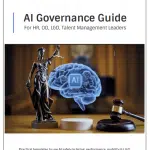Career Talent and Succession Management | Resource Hub
Workforce and talent management brings together the operational and strategic sides of managing people. Workforce management focuses on having the right capacity and skills in place to meet today’s needs. Career, Talent and Succession management takes a longer view — identifying and developing future leaders, creating succession pipelines, and aligning career growth with organizational strategy. Together, they ensure that the right people are in the right roles, now and in the future.
Why it matters
Effective talent and succession strategies are the foundation of organisational resilience. In an environment of rapid technological change and demographic shifts, capability cannot be left to chance. Data-driven frameworks align role requirements, career growth, and succession readiness — reducing the risks of skill loss, bias, and missed potential.
Readiness decisions break down when capability evidence is missing and assumptions fill the gaps. See Meritocracy and Better Talent Decisions for a practical decision-quality lens.
Common Challenges
Even mature organisations struggle to turn talent and succession planning into a consistent, evidence-based process.
Fragmented systems, unclear capability profiles, and bias in readiness assessments make it difficult to see who’s truly ready — and where development should focus next.
Without a structured framework that connects roles, capability data, and development plans, organisations risk:
- Losing critical skills when key people move or retire.
- Overlooking internal talent due to incomplete or outdated data.
- Making promotion and readiness decisions based on bias or perception.
- Failing to link development activity with actual role or business needs.
- Fragmented data across HR, LMS, and spreadsheets, making readiness hard to assess.
- Unclear role capability profiles that prevent accurate comparisons of potential successors.
- Limited visibility into employee aspirations and progress, reducing internal mobility.
Disconnection from business planning that weakens alignment with future workforce needs.
What an integrated system delivers
A capability-driven approach to talent, career, and succession planning delivers measurable organisational benefits.
By bringing role requirements, competency profiles, performance evidence, and development plans into one system, it replaces guesswork with data-driven insight.
- Clarity of expectations – Success profiles define what “ready” looks like for each critical role and level.
- Fair and transparent processes – Readiness ratings are based on verified capability and performance evidence, not perception or tenure.
- Targeted development – Learning, mentoring, and stretch assignments focus precisely on the gaps that matter for future roles.
- Increased retention and engagement – Visible career paths and mobility options help employees see a future with the organisation.
- Business continuity and risk mitigation – Position-based succession tracking ensures that every critical role has a verified, diverse pipeline of successors.
- Organisational agility – Integrated data connects workforce planning, development, and promotion decisions, enabling faster, more informed action.
Together, these practices turn succession planning from an HR exercise into a sustained capability advantage.
Explore Career, Talent and Succession Management Resources
This hub brings together practical frameworks, templates, and research on:
- Career path design and job family frameworks.
- Talent identification and readiness assessment.
- Succession planning and critical role tracking.
- AI-enabled career and talent analytics.
Each resource supports a consistent, evidence-based approach — helping you identify potential, plan development, and ensure leadership continuity.
Career Development
Give employees clear pathways for growth by linking capability, learning, and opportunity.
Career Development - a strategic initiative

Discover how structured career development initiatives build workforce capability and readiness. Learn proven practices, common pitfalls, and the role of technology in aligning employee growth with organisational strategy and future skills needs.
Internal Mobility Is Broken — And How Capability Data Fixes It

Why talent mobility stalls — and how clear capability requirements, proficiency levels and visual career pathways enable fair, transparent progression.
Talent Management
Build fair, data-driven talent processes that make readiness and mobility visible across your organisation.
Workforce Talent Management - Complete Guide

Workforce Talent Management – what it is – benefits 5 key pillars- future trends
Who is the talent- what is potential

Definitions and research into the factors that predict potential and how to measure them
9 Fatal errors in Talent Management

9 fatal errors through the Talent Management Lifecyle and how to fix them
Succession Management
Ensure leadership continuity with evidence-based readiness tracking and risk-aware succession plans.
Getting ready for Succession Planning

What is Succession Planning, Current issues in Succession Planning. Strategies – Buy or Develop Talent
Setting up an effective Succession Management process
The Use and Governance of AI
Explore how AI can enhance – and where it must never replace – human judgment in talent decisions.
Using AI in Talent Management

AI – types and algorithms. AI in Talent Management – risk, perils and positives.
AI in HR Processes - Key Questions

AI versus Generative AI. Key questions on the use of AI in Human Resources 2025
AI in Talent Management Risk & Governance Briefing

AI in Talent Management-Risk & Governance briefing – update – what changed, what works, common problems – identifying risk, governance needs
AI Governance Guide

AI Governance Guide for Talent Management Systems – for HR, OD, L & D & Talent Management Leaders. Practical templates to use AI safely

